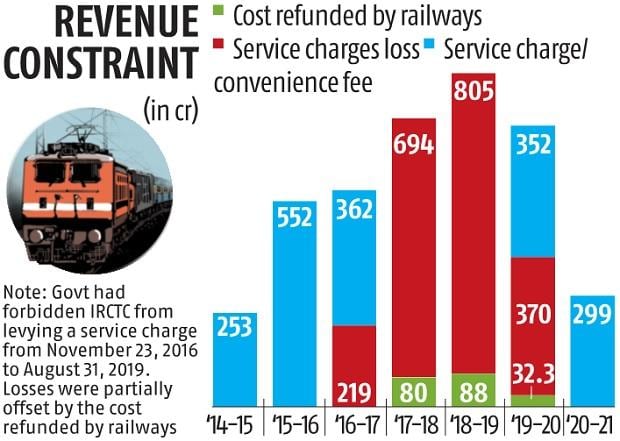
[ad_1]
Monday onwards, half the revenue that accrues to Indian Railway Catering and Tourism Corporation (IRCTC) through the convenience fee on train tickets will go to the Ministry of Railways. Officials in the know told Business Standard IRCTC’s management would meet on Friday to figure out a strategy to safeguard revenues.
According to IRCTC’s Annual Report, it earned Rs 299.13 crore from the convenience fee (also called service charge) during 2020-21. These gains were lower owing to the fall in railway ticket bookings after the pandemic came. IRCTC had earned Rs 349.64 crore in 2019-20.
“The ministry of railways has conveyed its decision to share the revenue earned from the convenience fee collected by IRCTC in the ratio of 50:50 with effect from November 1,” IRCTC said in a notice to the stock exchanges.
Before 2014, there was no sharing of service charge between IRCTC and the Railways though the latter decided the amount of the charge.
Sharing started in 2014 in the ratio of 80:20 between IRCTC and the Indian Railways. The ratio was changed to 50:50 in 2015 but the charge remained withdrawn for three years from November 2016.
Income from the convenience fee was the largest revenue earner for IRCTC in 2020-21. This is because income from the catering and comprehensive services fell from Rs 512.45 crore in 2019-20 to Rs 87.31 crore in 2020-21 due to Covid-related restrictions.
“After this move, investor confidence will be hit hard. The government will earn roughly Rs 350-400 crore as additional revenue, but the impact on the valuation of IRCTC is likely to be big,” said an analyst at a large brokerage.
“These moves will hurt sentiment as regards other public sector stocks,” he added.

A senior official said IRCTC booked around 700,000 tickets a day during the pre-pandemic period. “This has now risen to around 1.3 million a day. So even if the ministry takes half the revenue, IRCTC’s bottom line will not change much,” a senior official said.
Further, since sales on the counter are restricted, those through IRCTC have risen. The option of raising the service charge is not ruled out, the official added.
Balaji Subramanian, analyst at IIFL Securities, said the impact of the move would be significant because this was the most profitable segment and enjoyed an 80 per cent EBIT (earnings before interest and tax) margin.
IRCTC levied a service charge at Rs 20 plus tax a ticket for non-air conditioned (AC) classes and Rs 40 plus tax for AC classes on reserved rail tickets booked through its platform till November 22, 2016.
With the shortage of currency notes after demonetisation, the government pushed digital payments by waiving the service charge. This charge remained withdrawn from November 23, 2016, to August 31, 2019.
IRCTC resumed collecting the convenience fee on e-ticket bookings on September 1, 2019, at the rate of Rs 15 plus goods and services tax (GST) a ticket for non-AC classes and Rs 30 plus GST for AC classes (including first class). For BHIM/UPI payments, the convenience fee is being charged at a reduced rate of Rs 10 plus GST a ticket for non-AC classes and Rs 20 plus GST for AC classes.
 Dear Reader,
Dear Reader,
Business Standard has always strived hard to provide up-to-date information and commentary on developments that are of interest to you and have wider political and economic implications for the country and the world. Your encouragement and constant feedback on how to improve our offering have only made our resolve and commitment to these ideals stronger. Even during these difficult times arising out of Covid-19, we continue to remain committed to keeping you informed and updated with credible news, authoritative views and incisive commentary on topical issues of relevance.
We, however, have a request.
As we battle the economic impact of the pandemic, we need your support even more, so that we can continue to offer you more quality content. Our subscription model has seen an encouraging response from many of you, who have subscribed to our online content. More subscription to our online content can only help us achieve the goals of offering you even better and more relevant content. We believe in free, fair and credible journalism. Your support through more subscriptions can help us practise the journalism to which we are committed.
Support quality journalism and subscribe to Business Standard.
Digital Editor
[ad_2]
Source link